 Do you plan to set up an e-commerce web site, or sell goods or services worldwide? If so, then here’s a good idea: think about providing your prospects with the convenience of currency conversion on your e-commerce site.
Do you plan to set up an e-commerce web site, or sell goods or services worldwide? If so, then here’s a good idea: think about providing your prospects with the convenience of currency conversion on your e-commerce site.
Currency conversion tools let your web visitors have the price of an international currency transaction translated into their local currency when purchasing or checking out products on e-commerce sites. It also lets your visitors and customers view the exact amount their credit card or PayPal account will be charged, displayed in their own home currency.
One advantage of adding currency conversion is that it lets your customers view and understand pricing in foreign countries in their own home currency, and makes it easier for customers to calculate their costs and expenses.
If your site is built with WordPress, it’s easy and simple to add a currency converter to currency conversion to your WordPress website via a plugin, allowing your site visitors to quickly calculate the cost of your goods.
WordPress Free Currency Converter – Currencyr
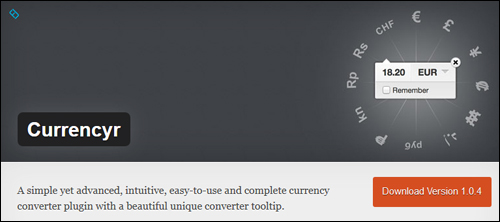
Currencyr is a simple yet advanced, intuitive, easy-to-use and complete currency converter plugin with a visually attractive converter tooltip. And, it’s completely free to install and use on your site.
This plugin includes features like:
- In-line converter
- Supports a number of exchange rates providers, like Yahoo!, Google, Open Exchange Rates, European Central Bank and FoxRates
- WP-Cron task scheduler enabled
- Currency table and converter widget
- Can be integrated with various online store plugins such as WooCommerce, WP-eCommerce, Shopp, and Easy Digital Downloads.
- Can determine local currency automatically
- Supports full translations
Important: The Currencyr plugin requires your server to be running PHP 5.3.0 or later. Do not use this plugin if you are running an older version of PHP. Ask your web host to upgrade your PHP.
***
You can install the Currencyr plugin from your WP admin area by typing in “currencyr” into the Plugins search field and clicking “Install Now” …
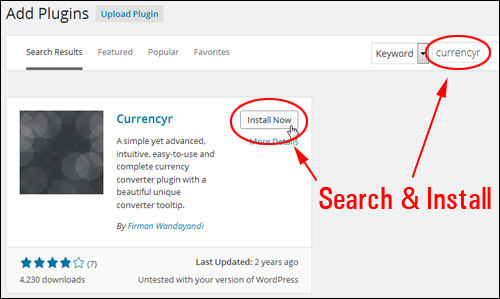
After installing and activating the plugin, you can get to the plugin’s settings by selecting Currencyr from your dashboard menu …
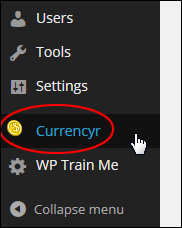
The plugin settings screen offers you many configuration options …
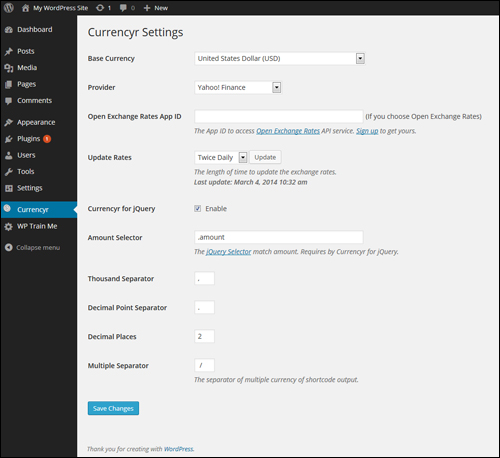
For example, you can select your base currency from the ‘Base Currency’ drop-down menu if you want a different currency than the default option ’United States Dollar’ …
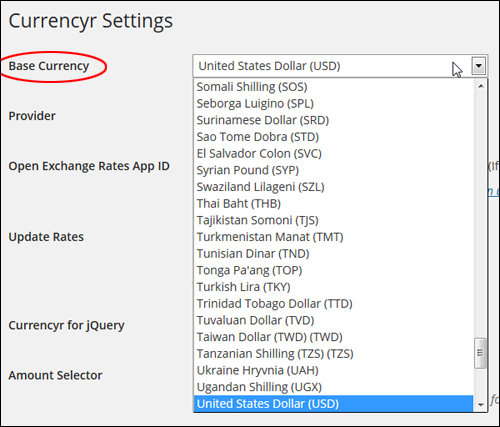
You can specify a data provider from the dropdown menu in the Provider section. The default provider is Yahoo Finance, but you can choose one of the other options, such as European Central Bank or Google Finance …

Note: If you choose ‘Open Exchange Rates’ as your provider, an API (Application Programming Interface) will be required …

You can choose how often you would like the exchange rates to be updated by choosing an option from the ‘Update Rates’ dropdown menu …

The plugin uses jQuery, which is an open-source library of Javascript code that lets web developers add things like animation effects to web applications (like WP plugins).
If you have no reason to change the jQuery settings, you can simply ignore this section …

Edit the remainder of the settings and remember to click Save Changes when finished …
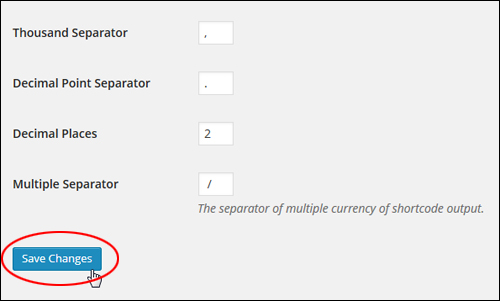
Once your plugin settings have been configured, you can easily start adding currency conversion to any WP post or page using widgets.
Refer to the ‘Additional Plugin Notes’ section below to learn more about using currency codes (e.g. USD, AUD, JPY, etc …) with this plugin.
Currencyr Shortcodes
You can easily add currency conversion to pages, posts and widgets without having to mess with your web templates using shortcodes.
Here are some examples of currency shortcodes that you can add to posts and pages:
Let’s say that you sell an item online for a set amount (e.g. $175) in US Dollars (USD), and you would like to display the conversion amount in British pounds (GBP) on your sales page.
To display this information, simply insert the following shortcode into your page content …

Note: You can also insert prices in dollars and cents (e.g. 155.25, 37.95, 544.97, etc …)
The example below shows how your shortcode looks after being inserted into a page or post …
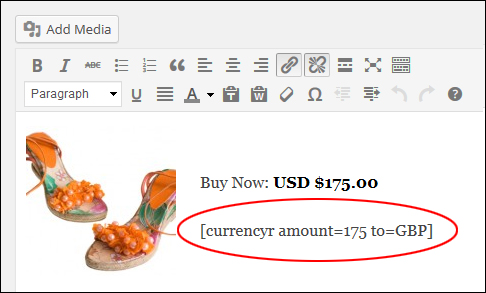
After publishing the information, the currency conversion will then display as shown below …
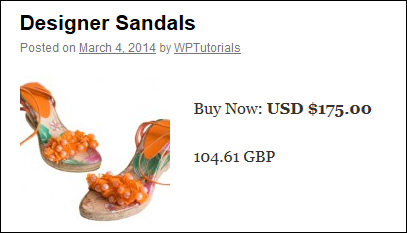
Using this example, let’s now translate the same price into different currency formats.
To do this, use the shortcode below (you can add as many currency symbols as you want separated by vertical pipes) …

The screenshot below now shows how the above shortcode appears when added to your content …

After publishing the page or post, the currency conversion will then display as you can see in the screenshot below …
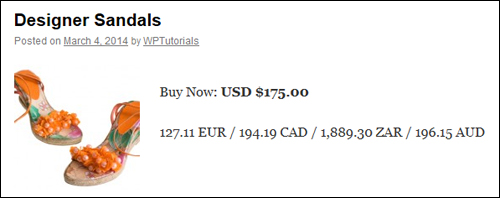
refer to the ‘Additional Plugin Notes’ section at the bottom of this tutorial to learn more about changing the currency separator symbol with this plugin.
Now, suppose you want to select a different base currency than the one set as the default.
For example, if you have set your default base currency as EUR and you have a section on your e-commerce pages targeted to customers from countries like Australia or Canada, you can change the base currency using the following shortcode …

The example below now shows how the shortcode appears when you add it to a post …
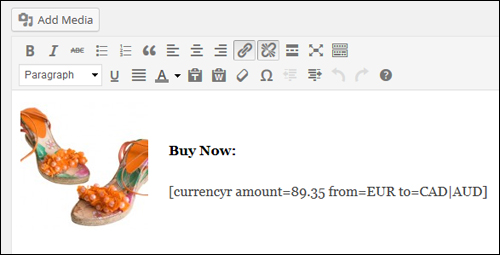
After publishing your page or post, your currency conversion will then display as seen in the screenshot below …
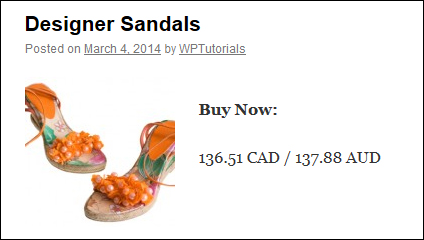
How To Use The Plugin Widget
You can also add currency conversion to your site’s sidebar section using a widget.
To add currency conversion to your sidebar area, select Appearance > Widgets from the WordPress user admin menu …
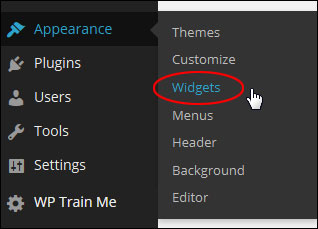
In the Widgets > Available Widgets section find the ‘Currencyr’ widget and add it to the Active Widgets area …
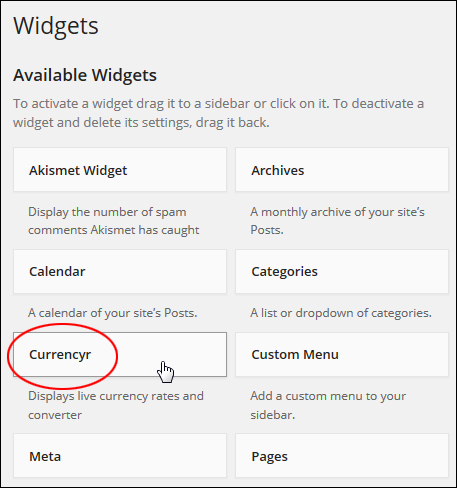
Configure the widget options as shown in the example below (add currency codes separated by a comma), and click ‘Save’ to update your settings …
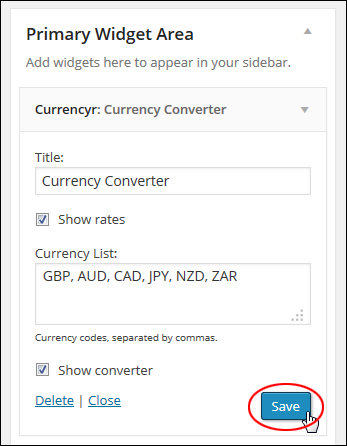
Your currency conversion tool will now show on the sidebar menu with the settings you have specified …
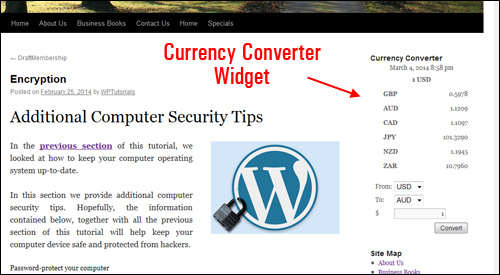
Additional Plugin Notes
Here are some additional notes and useful information about using the plugin.
Currency Separator
The Currencyr plugin lets you specify the symbol to display as the currency separator when using multiple currencies.
You can change the symbol in the Multiple Separator settings section.
So, for example, using the default symbol “/” (forward slash) …

Displays your currency values separated by a forward slash as you can see in the example below …
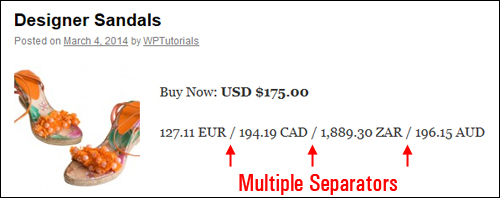
If you modify this symbol and update your settings …

Your site visitors will see the new symbol being used as the currency separator …
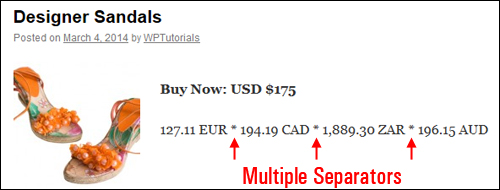
Integration With WordPress e-Commerce Platforms
As stated earlier, the plugin integrates with various WP-compatible e-commerce plugins such as WooCommerce, WP-eCommerce, Shopp, and Easy Digital Downloads …
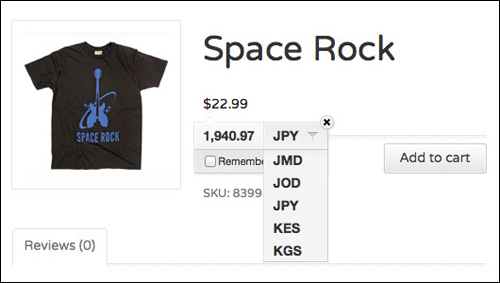
(above image sourced from Currencyr plugin website)
Congratulations! Now you know how to easily add a currency converter to your WordPress website.
To learn more about WordPress e-commerce plugins, see the tutorial below:
***
"These tutorials have so much information and are easy to understand. If you use WordPress or plan to in the future these will help you with everything you need to know." - Valisa (Mesa, Arizona)